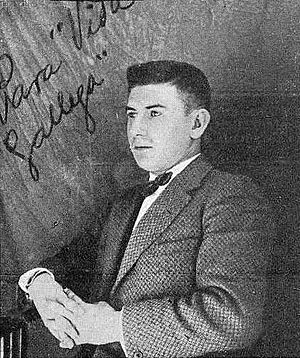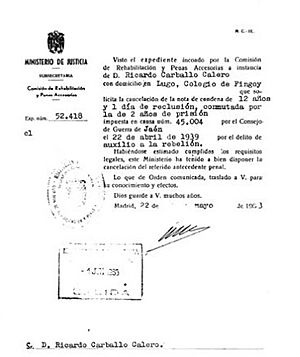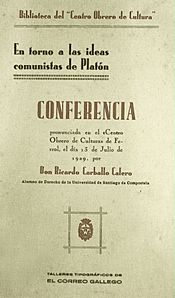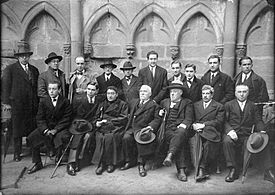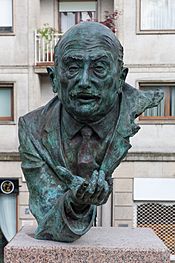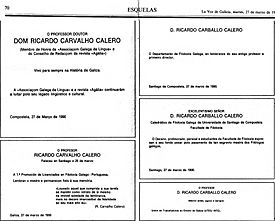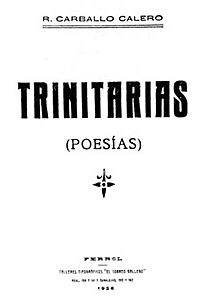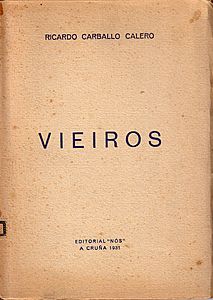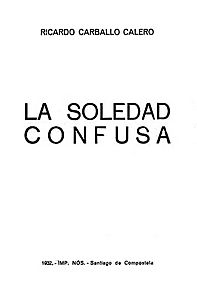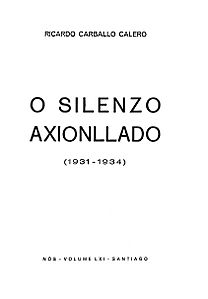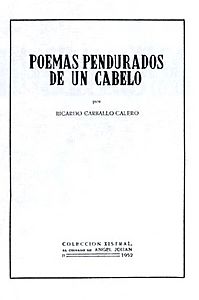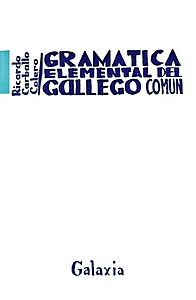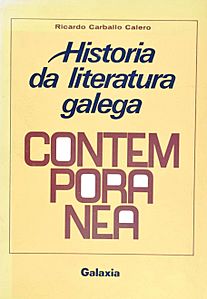Ricardo Carballo facts for kids
Quick facts for kids
Ricardo Carballo Calero
Ricardo Carvalho Calero |
|
|---|---|
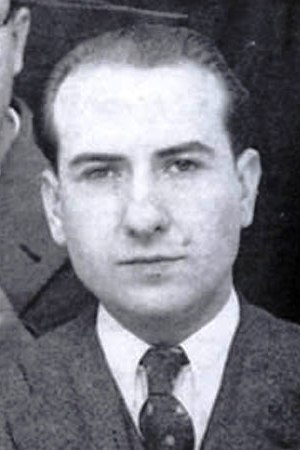 |
|
| Born | October 30, 1910. |
| Died | March 25, 1990 (aged 79) |
| Nationality | Galician |
| Citizenship | Spanish |
| Occupation | writer |
| Signature | |
 |
|
Ricardo Carballo Calero (born in Ferrol in 1910, died in Santiago de Compostela in 1990) was an important Spanish writer and language expert. He later changed his name to Ricardo Carvalho Calero in 1981. He was the very first professor to teach about the Galician Language and its literature at the University of Santiago de Compostela.
He was a member of important groups like the Royal Galician Academy. He also belonged to the Lisbon Academy of Sciences. Many people see him as one of the most important thinkers in Galicia during the 1900s. He was a key person in the idea of "reintegrationism," which is about how the Galician and Portuguese languages are connected.
Contents
Early Life and Politics
When Ricardo Carballo Calero was a student, he joined groups that were against the government at the time. In 1926, he moved to Santiago de Compostela. There, he studied Law and Philosophy. He also did his required military service.
While in Santiago, he learned about "Galicianism." This was a movement to support Galician culture and language. His political work became a big part of his life.
In 1931, he joined the Partido Galeguista (Galicianist Party). He helped write the first plan for Galician self-rule. This plan was called the Galician Statute of Autonomy. He also worked with other groups that supported Galician identity.
Difficult Times and University Work
After the Spanish Civil War started in 1936, Carballo Calero joined the army to fight for the Spanish Republic. He became a lieutenant. However, he was captured by the other side. He was sent to jail for being a "secessionist" (someone who wanted Galicia to separate). He was sentenced to 16 years in prison.
He was released from jail in 1941. He went back to his hometown of Ferrol. He could not work in public jobs, like teaching in schools. So, he became a private tutor.
Later, he started studying for his PhD degree. He earned it in 1955. His important book, Historia da literatura galega contemporánea (History of contemporary Galician literature), came out in 1963. In 1958, he was asked to join the Real Academia Galega (Royal Galician Academy).
In 1965, he was finally allowed to work in public jobs again. He moved to Santiago de Compostela. He taught Galician language and literature at a high school. He also started teaching at the University of Santiago de Compostela. In 1972, he became the first university professor of Galician Linguistics and Literature.
At this time, Carballo Calero was known as the top expert on the poet Rosalia de Castro. He also helped publish books by other classic Galician writers.
The Idea of Reintegrationism
As he studied the Galician language, Carballo Calero became very interested in how words developed. He also learned a lot about the history of the Galician-Portuguese language. This led him to a big idea called "reintegrationism."
Simply put, this idea says that Galician and Portuguese were once the same language. Carballo Calero believed they were still the same language today. He became the main supporter of this view.
After the Franco government ended in 1977, Galicia became a region with its own government. Galician became an official language along with Spanish. It was important to create a standard way to write Galician.
Carballo Calero was chosen to lead a group of experts. Their job was to create new rules for the Galician language. Their first plan came out in 1979. It suggested that Galician writing should be more like Portuguese.
However, some people thought that making Galician too much like Portuguese was a political idea. Because of this, the new rules were stopped by a special law. Carballo Calero did not agree with this. He resigned from his position in 1980.
New rules were made in 1982 by a different group. Carballo Calero had already helped create the Galician Association for the Language in 1981. He thought the new rules were not good for the language. He said they were "political and not scientific."
In 1984, he received the Medalla Castelao. This is the highest award for a civilian in Galicia. Ricardo Carballo Calero passed away in Santiago de Compostela in 1990.
Selected Works
Ricardo Carballo Calero wrote many books, poems, and plays. Here are some of his most well-known works:
Poetry
- Trinitarias, 1928 (in Spanish)
- Vieiros, 1931
- La soledad confusa, 1932 (in Spanish)
- O silencio axionllado, 1934
- Anxo da terra, 1950
- Poemas pendurados dun cabelo, 1952
- Calteiro de Fingoi, 1961
- Pretérito Imperfeito, 1980
- Futuro condicional, 1982
- Cantigas de amigo e outros poemas, 1986
- Reticências, 1990
Theatre
- O fillo, 1982
- Isabel, 1982
- A sombra de Orfeo, 1971
- Farsa das zocas, 1963
- A arbre, 1965
- O redondel, 1979
- Auto do prisioneiro, 1970
- Os xefes, 1982
- Catro pezas, 1971
- Teatro completo, 1982
Narrative
- Xente da Barreira, 1951
- Narrativa completa, 1984
- Scórpio, 1987
Essay
- Sete poemas galegos, 1955
- História da Literatura Galega Contemporánea, 1963
- Gramática elemental del gallego común, 1966
- Estudos rosalianos, 1977
- Problemas da Língua Galega, 1981
- Da Fala e da Escrita, 1983
- Letras Galegas, 1984
- Escritos sobre Castelao, 1989
- Do Galego e da Galiza, 1990 (published after his death)
- Umha voz na Galiza, 1992 (published after his death)
Some Covers
See also
 In Spanish: Ricardo Carballo Calero para niños
In Spanish: Ricardo Carballo Calero para niños
 | Georgia Louise Harris Brown |
 | Julian Abele |
 | Norma Merrick Sklarek |
 | William Sidney Pittman |


